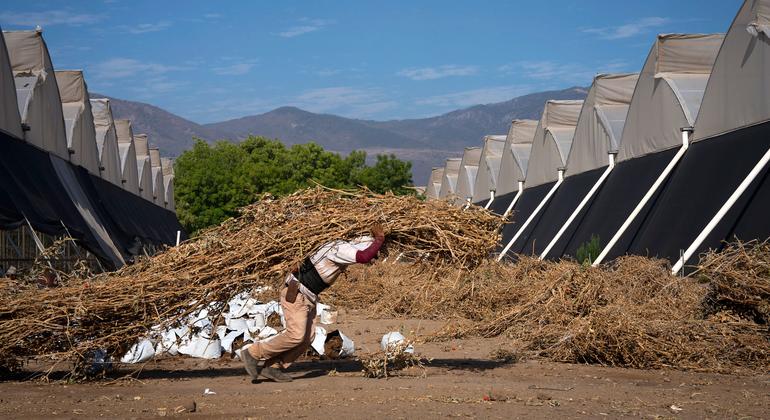
Temperatures in July broke new records. UN chief calls for urgent action to protect people from extreme heat Climate and Environment
Billions of people are facing an “epidemic” of extreme heat and increasingly deadly heat waves exceeding 50 degrees Celsius. This was stated by UN Secretary-General Antonio Guterres, introducing his new Call to Action to combat extreme heat.
New data indicates last Sunday, Monday and Tuesday were the three hottest days on record, the UN chief said.
Extreme Heat destroys economies, increases inequality, undermines the Sustainable Development Goals and causes loss of life. The earth is becoming an increasingly hot and dangerous place to live. The Call to Action is the first of its kind to highlight the multi-sectoral impacts of extreme heat, drawing on the experience of ten UN specialized agencies.
Life-threatening
June 2024 became the 13th month in a row that set a temperature record. The UN chief’s report warns that without immediate action, billions of people will continue to suffer from increasingly severe heat waves. Those most at risk as temperatures rise include pregnant women, people with disabilities and underlying health conditions, the elderly, children, displaced people and the poor, who often live in substandard housing without air conditioning.
Heat stress is the leading cause of death associated with extreme weather conditions. An estimated 489,000 heat-related deaths occurred annually between 2000 and 2019, with 45 percent in Asia and 36 percent in Europe. Heat-related deaths among people over 65 increased by about 85 percent between 2000-2004 and 2018-2022.
Read also:
UNICEF: heat in Europe and Central Asia kills almost 400 children a year
Experts from the United Nations Children’s Fund (UNICEF) have concluded that if current conditions continue, by 2050 almost every child in the world under the age of 18 – 2.2 billion children – will be exposed to heat waves, compared with 24 percent of children in 2020.
Impact on workers
More than 70 percent of the world’s workforce – 2.4 billion people – are currently at high risk from extreme heat, according to new data from the International Labour Organization (ILO).

“We have identified 22.8 million work-related injuries related to extreme heat, almost 19 thousand deaths and more than 26 million cases of kidney disease as a result of prolonged exposure to heat at work,” said ILO expert Balint Nafradi.
In 2022, heat exposure caused the equivalent of $863 billion in lost work productivity and potential income. However, according to ILO estimates, when daytime temperatures rise above 34 degrees Celsius, labor productivity falls by 50 percent.
Action Plan
UN chief calls for urgent and concerted efforts to strengthen international cooperation in four critical areas.
First, all countries and communities must protect the most vulnerable populations from the effects of extreme heat, reduce risks and increase resilience. The World Health Organization (WHO) and the World Meteorological Organization (WMO) estimate that expanding heat warning systems in 57 countries could save nearly 100,000 lives each year.
Improved access to low-carbon cooling, expansion of passive cooling, such as through urban design, and greener and more efficient solutions are needed, Guterres said. The UN Environment Program estimates that together these measures could protect 3.5 billion people by 2050, while reducing emissions and saving consumers $1 trillion a year, the UN chief noted.
Secondly, the Secretary-General called for the protection of workers in all sectors through appropriate occupational safety and health measures based on human rights principles. In particular, urgent action must be taken to protect the health and lives of workers in all regions of the world from the risk of extreme heat.
In addition, the UN calls on all countries and communities to create sustainable, multi-sectoral and multi-level partnerships that ensure the development and implementation of comprehensive action plans, strategies and solutions to improve weather resilience.
Finally, the UN chief reiterated the importance accelerating the pace of a just transition away from fossil fuels and expanding investment in renewable energy. By early 2025, under the Paris Agreement, each country must submit a new Nationally Determined Contribution (NDC) with emissions reduction targets.
